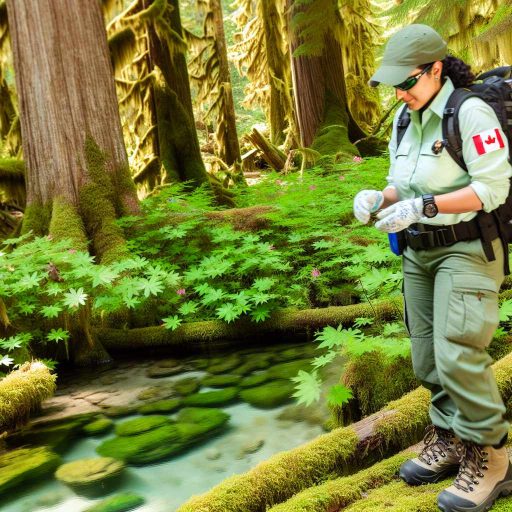Overview of the Environmental Officer Role in Canada
The role of an Environmental Officer is essential in Canada.
They ensure compliance with environmental regulations.
Furthermore, they promote sustainable practices in various sectors.
Key Responsibilities
Environmental Officers conduct inspections and assessments.
They monitor environmental impacts of projects.
Additionally, they enforce environmental laws and regulations.
They also provide expert advice to policymakers and businesses.
Required Qualifications
A relevant degree in environmental science is typically necessary.
Furthermore, candidates often need field experience.
Strong analytical and communication skills are essential.
Additionally, proficiency in environmental legislation is important.
Work Environment
Environmental Officers work in various settings.
They may be employed by government agencies or private firms.
Fieldwork and office duties comprise their routine.
Moreover, they often collaborate with other professionals.
Career Growth Opportunities
The demand for Environmental Officers continues to grow in Canada.
They may advance to senior positions in management.
Additionally, opportunities exist in consulting and research.
Moreover, they can specialize in fields like air quality or waste management.
Education and Qualifications Needed for Environmental Officers
Educational Background
A bachelor’s degree is typically required for environmental officers.
Common fields of study include environmental science, biology, or environmental policy.
Some roles may require advanced degrees, like a master’s in environmental management.
Specialized courses in ecology, geology, and environmental law are beneficial.
Certifications
Certifications enhance credibility and knowledge for environmental officers.
Popular certifications include the Certified Environmental Specialist (CES) credential.
Unlock Your Career Potential
Visualize a clear path to success with our tailored Career Consulting service. Personalized insights in just 1-3 days.
Get StartedAdditionally, the Leadership in Energy and Environmental Design (LEED) certification is valuable.
Other certifications focus on specific areas, such as waste management or air quality.
Skills Development
Developing strong analytical skills is crucial for environmental officers.
They must assess data and evaluate environmental impacts effectively.
Communication skills are equally important for reporting and presenting findings.
Furthermore, project management skills can enhance career prospects.
Field Experience
Internships offer essential hands-on experience in the environmental field.
Fieldwork is crucial for applying theoretical knowledge to real-world situations.
Volunteering with environmental organizations also provides valuable experience.
Networking with professionals in the field can open job opportunities.
Continuing Education
Staying updated on environmental regulations and technologies is vital.
Workshops and seminars can provide insights into industry trends.
Online courses offer flexible opportunities for skill enhancement.
Furthermore, association memberships provide access to resources and networking.
Key Skills Required for a Successful Career as an Environmental Officer
Technical Knowledge
An Environmental Officer must possess strong technical knowledge.
This includes understanding environmental regulations and compliance standards.
Moreover, familiarity with environmental assessment tools is crucial.
Analytical Skills
Analytical skills are essential for effective problem-solving.
Environmental Officers need to interpret data accurately.
Furthermore, they should assess environmental impact efficiently.
Communication Skills
Strong communication skills are vital for collaboration.
Environmental Officers often facilitate discussions with stakeholders.
Additionally, they prepare reports and presentations clearly.
Project Management Abilities
Project management abilities play a significant role in success.
Environmental Officers oversee multiple projects simultaneously.
They must ensure projects align with environmental policies.
Attention to Detail
A keen attention to detail helps prevent costly mistakes.
This skill ensures compliance with various environmental laws.
Also, it aids in accurate data collection and analysis.
Teamwork and Leadership
Teamwork and leadership skills enhance collaborative efforts.
Environmental Officers often work with diverse teams.
They may also be responsible for leading specific initiatives.
Passion for the Environment
A genuine passion for the environment drives motivation.
This enthusiasm fosters commitment to protecting natural resources.
Moreover, it inspires others to engage in sustainability efforts.
Find Out More: Environmental Laws Every Canadian Officer Should Know
Career Paths and Progression Opportunities in Environmental Sectors
Introduction to Environmental Careers
The environmental sector in Canada offers diverse career paths.
Professionals contribute to sustainability and environmental protection.
They play crucial roles in various industries and organizations.
Entry-Level Positions
Entry-level positions provide a solid foundation for aspiring environmental officers.
Many candidates start as environmental technicians or assistants.
These roles often require relevant education and hands-on experience.
Typical duties include data collection and analysis of environmental impact.
Mid-Level Roles
Mid-level positions offer further specialization opportunities.
Environmental officers can move into roles such as project coordinators.
They may also become environmental consultants for various organizations.
These jobs require a deeper understanding of regulations and policies.
Senior-Level Opportunities
Senior-level roles often involve leadership and strategic planning.
Environmental managers oversee teams and projects.
They ensure compliance with environmental regulations and policies.
Additionally, they develop sustainability strategies for organizations.
Progression within Organizations
Within organizations, career progression is common.
Employees can advance from technician roles to senior management.
This movement often relies on performance and continued education.
Networking within the environmental sector can also open doors.
Specialization Areas
Specialization in different areas enhances career opportunities.
Areas such as waste management, conservation, and renewable energy are key.
Furthermore, professionals can focus on environmental policy and advocacy.
This specialization allows individuals to tailor their careers to their interests.
Certifications and Continuing Education
Certifications elevate qualifications and enhance job prospects.
Programs such as LEED accreditation or ISO 14001 certification are beneficial.
Continuing education keeps professionals updated on industry trends.
Workshops and seminars also provide valuable networking opportunities.
Job Market Trends
The Canadian job market is increasingly focused on sustainability.
Many organizations are hiring environmental officers to meet compliance requirements.
The push towards clean energy creates additional job opportunities.
Staying informed about market trends is essential for career advancement.
See Related Content: Qualifications Needed for Veterans Affairs Officer Jobs
Major Employers and Organizations Hiring Environmental Officers in Canada
Government Agencies
Various government agencies actively recruit environmental officers.
Environment and Climate Change Canada provides numerous opportunities.
Provincial ministries of environment seek qualified candidates as well.
Municipal governments often employ environmental officers for local initiatives.
These roles focus on compliance monitoring and policy implementation.
Non-Governmental Organizations
Several non-profit organizations also hire environmental officers in Canada.
The World Wildlife Fund Canada leads numerous conservation projects.
Greenpeace Canada offers positions in advocacy and policy development.
Environmental Defence works on water and air quality issues.
These organizations promote sustainability and environmental protection.
Consulting Firms
Environmental consulting firms frequently seek environmental officers.
Firms like Golder Associates provide expertise in environmental assessments.
Jacobs Engineering focuses on consulting and engineering solutions.
Other firms specialize in sustainability practices and regulatory compliance.
Environmental officers in these firms conduct assessments and develop strategies.
Private Sector Companies
Many private companies are hiring environmental officers for compliance roles.
Energy companies comply with stringent environmental regulations.
Manufacturing firms often need support for pollution control initiatives.
Retail brands increasingly focus on sustainable supply chain management.
Environmental officers ensure these companies meet their sustainability goals.
Academic and Research Institutions
Universities and research facilities also employ environmental officers.
These roles focus on researching environmental impacts and solutions.
They often collaborate on projects with government and industry partners.
Environmental officers help develop educational programs and outreach efforts.
The goal is to promote awareness of environmental issues among students and staff.
Gain More Insights: How Ombudsmen Help Resolve Workplace Disputes

Salary Expectations and Job Market Trends for Environmental Officers
Current Salary Overview
Environmental Officers in Canada earn competitive salaries.
The salary range typically varies based on experience and location.
Entry-level positions usually start around $50,000 annually.
Mid-level professionals can earn between $70,000 and $90,000.
Experienced officers may command salaries exceeding $100,000.
Additionally, specific sectors may offer higher pay rates.
Regional Salary Variations
Salaries for Environmental Officers vary significantly across Canada.
For example, salaries in urban centers are generally higher.
Toronto and Vancouver often provide the best compensation packages.
Conversely, rural areas may offer lower salaries.
However, rural positions may include additional benefits or perks.
Job Market Trends
The job market for Environmental Officers is expanding steadily.
Increasing environmental awareness drives demand across industries.
Government regulations encourage hiring in various sectors.
Moreover, industries like renewable energy show significant growth potential.
Technology advancements create new roles focused on sustainability.
Employment Opportunities
Environmental Officers can find opportunities in numerous sectors.
- Government agencies offer positions focused on compliance.
- Private companies seek officers to enhance sustainability practices.
- Non-profit organizations often hire for advocacy and education roles.
- Consulting firms require experts for environmental assessments.
- Research institutions look for officers to support various projects.
Future Job Prospects
The outlook for Environmental Officers remains positive.
Emerging industries prioritize sustainability, leading to further openings.
Moreover, environmental policies are likely to become stricter.
Consequently, more professionals will be needed to ensure compliance.
Continued education and certification will enhance job security.
Learn More: Roles and Responsibilities of a Border Services Officer
Impact of Government Policies and Regulations on Environmental Careers
Overview of Current Policies
Government policies play a crucial role in shaping environmental careers in Canada.
These policies outline regulations that all businesses must follow.
In particular, environmental protection acts govern resource management.
Furthermore, climate action strategies create job opportunities in various sectors.
Influence of Regulatory Changes
Regulatory changes often reshape job landscapes significantly.
For example, stricter emissions standards lead to increased demand for environmental officers.
Additionally, funding for conservation projects expands available positions.
In turn, non-profits often benefit from government grants aimed at sustainability initiatives.
Challenges and Opportunities
While policies create opportunities, they can also pose challenges.
Professionals must stay updated on evolving regulations to remain competitive.
Moreover, businesses may struggle to comply with new regulations, requiring more expertise.
This creates a need for specialized training and education in the field.
The Role of Provincial and Federal Governments
Both provincial and federal governments contribute to environmental policy frameworks.
Federal initiatives often set the stage for nationwide standards.
Conversely, provinces may implement stricter regulations tailored to regional needs.
This dual approach can create varied job opportunities across Canada.
Future Trends in Environmental Policies
An increased focus on sustainability is shaping future policy directions.
This trend suggests a growing market for environmental professionals.
Moreover, new technologies will likely lead to innovative policies and practices.
As a result, environmental careers may evolve rapidly to meet these demands.
Networking and Professional Organizations for Environmental Officers in Canada
Importance of Networking
Networking plays a crucial role in advancing your career as an environmental officer.
It opens up new opportunities and connects you with industry experts.
Additionally, networking can lead to potential job openings that aren’t publicly advertised.
Building a strong professional network increases your visibility in the field.
Professional Organizations to Join
Joining professional organizations can enhance your career prospects.
These organizations offer resources, guidance, and networking opportunities.
- The Canadian Environmental Assessment Agency promotes best practices in environmental assessments.
- The Canadian Institute of Planners focuses on sustainable land use planning.
- The Environmental Careers Organization Canada connects professionals with job opportunities.
- The Canadian Ecology and Evolution Society supports ecological research and policy.
Networking Events and Conferences
Participating in industry events is an effective way to meet peers.
Conferences provide platforms for sharing knowledge and discussing pressing environmental issues.
Events like the Canadian Environmental Conference foster collaboration and learning.
Additionally, workshops help develop specialized skills relevant to your role.
Utilizing Online Platforms
Online platforms offer invaluable resources for networking.
LinkedIn is a powerful tool for connecting with other professionals in your field.
Joining relevant groups can further enhance your networking efforts.
Moreover, engaging with discussions helps build your reputation as an expert.
Building Relationships with Mentors
Finding mentors can significantly impact your career development.
A mentor can provide guidance and share invaluable experiences.
Additionally, they can introduce you to their professional network.
Building a mentor-mentee relationship takes time and effort. Be patient.
Volunteer Opportunities
Volunteering can expand your network and skills simultaneously.
Many non-profits and community organizations welcome environmental volunteers.
This experience often leads to new connections and potential job offers.
Furthermore, it demonstrates your commitment to environmental causes.
Additional Resources
Job description, salary and benefits: Border services officers
Careers at our Canadian offices abroad | Global Affairs Canada




